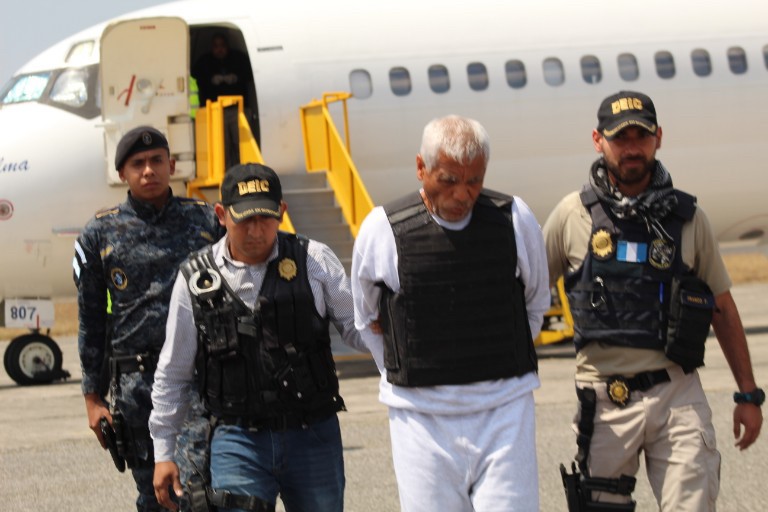The United States deported former Guatemalan special forces soldier Gilberto Jordán back to Guatemala today, after he served a ten-year sentence in the United States on charges of illegal procurement of U.S. citizenship and for his participation in the massacre at Las Dos Erres in December 1982. When U.S. authorities arrested him in Florida in 2010, Jordán admitted to killing a baby and throwing it into the town well. A special forces Kaibil unit at Las Dos Erres killed an estimated 200 people.
Upon his arrival today, Guatemalan authorities immediately took Jordán into custody on domestic charges related to the massacre. They will bring him before a judge, who will inform him of the charges against him and set a date for his first declaration hearing.

While he was serving his sentence in a Florida prison, Jordán testified against his superior officer, Lt. Jorge Vinicio Sosa Orantes, who was arrested in Canada in 2011 and then extradited to the United States. (He had been living in the United States and fled first to Mexico, then Canada, when he learned that he was being investigated.) A U.S. district court convicted Sosa Orantes in 2013 and sentenced him to ten years for illegal procurement of U.S. citizenship and for lying on immigration forms about his role in Dos Erres massacre. Jordán identified Sosa Orantes as the senior official who gave the order to the Kaibil soldiers to “kill all the people” at Las Dos Erres.
Jordán was one of two former Kaibils to testify in the U.S. immigration case against Sosa Orantes. The other was César Franco Ibañez, one of two ex Kaibils who broke the military code of silence in the mid-1990s to testify about their first-hand participation in the Dos Erres massacre.
Jordán’s testimony, along with that of Ibañez, was key to Sosa’s conviction. According to an account of the trial published by Sebastian Rotella at ProPublica, together, their testimony “placed Sosa at the edge of the well, supervising the methodical extermination of the villages. The commandos blindfolded their victims, questioned them, slammed them on the head with a metal sledgehammer and dumped them into the well, according to the testimony. Both witnesses testified that a man who had fallen onto the pile of victims insulted Sosa, and the enraged lieutenant fired his gun into the well. Jordán testified that Sosa also tossed a grenade in the well.”
Sosa Orantes may be returned to Guatemala this year. His time served in pretrial detention in Canada and the United States will be counted toward his total ten-year sentence.
Another former Kaibil soldier implicated in the Dos Erres massacre, José Ortiz Morales, is awaiting deportation from the U.S. to Guatemala. In September 2017, he was convicted and sentence to one year in prison for unlawful procurement of U.S. citizenship.
To date, Guatemalan courts have convicted three Kaibil soldiers and one army official for their roles in the Dos Erres massacre. The most recent conviction was the 2018 sentence against ex Kaibil Santos López Alonso, who had been deported from the United States. He was sentenced to 5,160 years in prison.
However, the intellectual authors of the Dos Erres massacre have not yet been held accountable. Efrain Ríos Montt, who was the de facto president at the time of the massacre, was indicted and awaiting trial in this case, but he died before the trial began.
Jordán was not a Kaibil at the time of the Dos Erres massacre. He later graduated as a Kaibil and continued to serve in the Guatemalan military for several more years. According to sources close to the case, he participated in other atrocities.
Jo-Marie Burt is an Associate Professor of Political Science and Latin American Studies at George Mason University. She is also a Senior Fellow at the Washington Office on Latin America (WOLA). Paulo Estrada is a human rights activist, archaeology student at San Carlos University, and civil party in the Military Diary case.
